Budget Rider Provides Medical Cannabis Protections, For Now
Leave a Comment
President Trump just signed the $1.3 trillion spending bill, and it looks like the entire country is angry. The only people happy with this are the medical cannabis patients and providers who’ve received yet another stay of execution via the Rohrabacher-Blumenauer Amendment. But will this happiness last?
What you'll learn in this post:
[Click any of the section titles below to jump there]
What Is the Rohrabacher-Blumenauer Amendment?
Originally called the Rohrabacher-Farr Amendment, the Rohrabacher-Blumenauer Amendment stops the federal government from funding enforcement efforts against medical cannabis in legal states.
First introduced in 2001 by Maurice Hinchey, the amendment took over a decade to pass through the House and become enforceable as part of the omnibus spending bill in 2014. Since then it’s been successfully renewed; however, the fight was particularly dicey this time due to Attorney General Jeff Sessions’ attempted interference.
And the sense of relief among cannabis patients is almost palpable today – especially in light of Sessions’ increasingly alarming announcements. In fact, his choice to rescind the Cole Memo was just the start of a Nixonian attempt to reignite the drug war. Sessions also reversed an Obama-era stance that prevented asset forfeiture abuse by law enforcement.
Worse, just this week Sessions induced the eye-roll heard ’round the world when he literally encouraged the death penalty for drug dealers. Cannabis activists and patients are glad that such ill-conceived concepts won’t affect them – at least until the 2019 budget.
How Long Will the Amendment Protect Us?
Only until about September, when it must be renewed yet again with the 2019 budget bill. And as much trouble as President Trump has trying to convince Congress to dance to his tune, the 2019 budget could take just as long to approve as it did this year. So, in a few months, medical cannabis patients will surely be sweating again.
But do these protection gaps really matter? After all, the amendment has been fairly successful and most Americans now support it. But as it turns out, those gaps do matter. If the amendment doesn’t pass next year, prosecution efforts could move forward on several federal cases currently on hold.
What the Rohrabacher-Blumenauer Amendment Isn’t
The amendment recently had the support of a 9th Circuit Court of Appeals ruling. The decision overruled the Justice Department’s aggressive stance toward medical cannabis and forced them to acknowledge that the amendment does prevent federal enforcement against medical users and dispensaries in legal states. But it’s still not a free-for-all.
These protections only apply to cannabis for medical use. They don’t protect recreational users. There was an attempt to protect recreational users as well, initiated by Senator Cory Gardner of Colorado, but his efforts failed to gain enough supporters for this round of federal funding.
If the community wants to protect newly-won recreational cannabis rights in the eight states that have moved out of the dark ages, it’s going to take some serious effort. Sessions has proven to be rather rabid on the issue.
What We Need to Watch For
First, stay informed. After all, a good defense is the best offense. See a roadmap to the prohibitionists’ efforts to renew the drug war here. This conservative article from exactly one year ago shares 11 tactics that the federal government can use to enforce federal cannabis prohibitions, and several of these tactics have already been initiated. So this author must be on to something.
Among the most alarming suggestions are:
- Rescinding the Financial Crimes Enforcement Network’s bank guidelines.
- Using RICO (racketeering prevention laws) as a prosecution tool.
- Coordinating with lower level state officials.
- Prosecution of cannabis operations’ financiers (including general stockholders?).
- Selecting businesses that are in violation of both state and federal law to prosecute.
Tactics like these can be easily be halted in their tracks by informing state and local representatives that we support a legal and safe market for cannabis, not a return to the prohibitionist stone age.
At least we can breathe a small sigh of relief knowing that the most vulnerable members of our cannabis community are safe – for now.
What Does the Congressional Cannabis Caucus Mean for Weed?
Leave a Comment
To date, 44 states and territories, including D.C., Guam and Puerto Rico, have passed laws allowing the use of medical marijuana in one form or another. Our President promised during his campaign trail that he would respect state’s rights concerning this issue and leave enforcement in the hands of local governments.
Yet the industry is now growing more and more concerned over recent comments from Trump’s new pick for Attorney General, Jeff Sessions. Will Trump keep his promises? Does the administration even have the power to stop the full-speed legalization train even if they wanted to? What can the Congressional Cannabis Caucus do to secure a better future for cannabis?
What you'll learn in this post:
[Click any of the section titles below to jump there]
Could We Really Move Backwards?
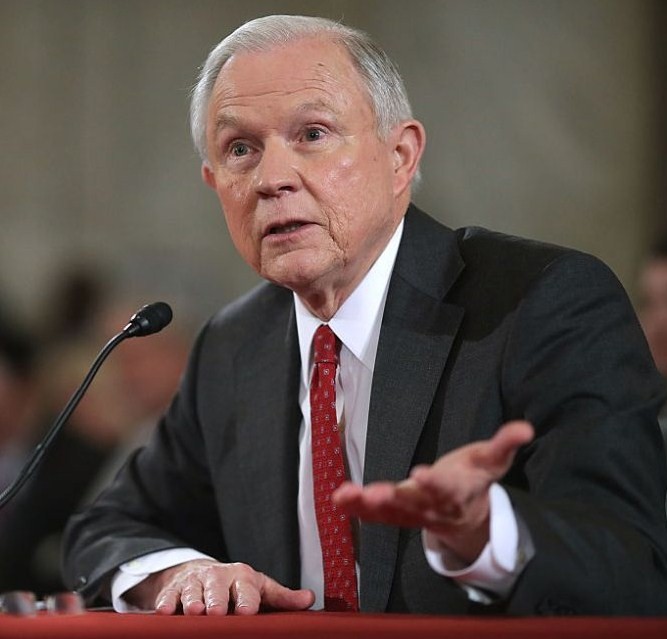
Yes, those who live in legal cannabis states are wondering how safe their investments are. And it’s a fair concern. After all, much of the conversation from GOP stalwarts surrounding legalization is focused on the old knee-jerk arguments from the Reagan Era drug war, statements that have now been proven shockingly false.
For instance, Sessions released a statement just over a week ago saying, “I reject the idea that America will be a better place if marijuana is sold in every corner store. And I am astonished to hear people suggest that we can solve our heroin crisis by legalizing marijuana–so people can trade one life-wrecking dependency for another that’s only slightly less awful. Our nation needs to say clearly once again that using drugs will destroy your life.”
More than 33,000 people died from prescription opioids and illegal heroin in 2015. Roughly half of these deaths were from doctor prescribed medicine.
Yet in the states that have recently legalized medical marijuana use, those deaths have already been reduced by 25 percent.
The lack of scientific and epidemiological understanding in our nation’s leaders is staggering. But how many times can cannabis advocates keep saying that marijuana has never killed a single person and has saved quite a few lives? Till they’re blue in the face? What can you do in the face of such a colossal lack of logical thinking and basic understanding?
The Economic Discussion
According to a recent report from Arcview, legal cannabis sales neared $7 billion in 2014. That’s a whole lot of economy.
Thousands of people have put their life savings into starting new businesses and creating jobs while working with cooperative administrations that realize regulation works best. Some of these companies employ hundreds of people and pay taxes, fees and licenses. In Colorado, for fiscal year 2017 alone, this tax, fee and license income totaled $144,820,374; incidentally a $47 million increase from the year before.
So, the better question might be, how would the Trump administration convince states that are seeing the economic and health benefits of legalization (tax revenue, higher employment, law enforcement savings) to give them up?
It might be safe to assume that the federal government doesn’t have a chance in hell of convincing any legal state to accept the negative rhetoric any more. But four members of Congress aren’t taking any chances.
Meet the Congressional Cannabis Caucus
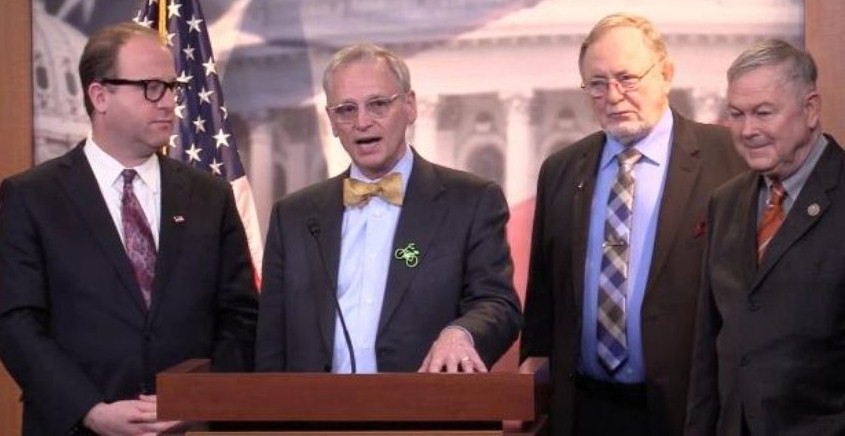
Pot rights powerhouses Rep. Dana Rohrabacher (R) and Rep. Earl Blumenauer (D) have established a new Congressional Cannabis Caucus to fight for more sensible drug laws from the start of the Trump administration. The two other founding members are Rep. Don Young (R) and Rep. Jared Polis (D).
Polis summed up the reasoning behind their decision to form this caucus, saying:
I think, all four of us, we don’t want to be in a place where we are relying on the goodwill of which side of the bed any attorney general wakes up on in any given day. That’s why we’re pursuing statutory changes.
Respect State Marijuana Laws: Third Time’s a Charm?
Rep. Rohrabacher is hoping that the third time’s a charm with his landmark Respect State Marijuana Laws Act.
This bill, currently listed under H.R. 975, is short, sweet and to the point. It’s a one sentence amendment to Part G Sec. 710 of the Controlled Substances Act, which reads:
Notwithstanding any other provision of law, the provisions of this subchapter related to marijuana shall not apply to any person acting in compliance with State laws relating to the production, possession, distribution, dispensation, administration, or delivery of marihuana.
That’s it. The entire bill in its current form. But this tiny paragraph could literally change drug law in the nation forever and prevent Sessions from moving against the legal states.
When introducing H.R. 975 to congress in January, Rep. Rohrabacher said:
It’s a travesty that we don’t know what marijuana can be positively used for or what the negative impact is because we haven’t done the research. That is a travesty. It’s a travesty when our veterans come home and they’re given opiates…and our veterans end up killing themselves because now they’re addicted to an opiate.
Unfortunately so far, it’s only been referred to committee by default, the graveyard where 96% of all bills go to die. Currently the bill has 8 Democrat and 8 Republican cosponsors, but cosponsors aren’t necessarily a predictor of success. Bipartisan cosponsors, on the other hand, are a very good sign. Also, so is buzz in the media.
One of the biggest buzz points for this bill is that it makes banking for cannabis businesses possible, thus enabling the 46 additional billion dollars in black market sales to safely enter the legal tax revenue stream.
This is becoming a very tempting point for many lawmakers, even though this same bill has failed to move forward twice before. But Members of Congress need encouragement from constituents to sponsor pro-cannabis bills considering the opposition they face from establishment members—people they deal with on a daily basis.
The McClintock-Polis Amendment
Meanwhile, Rep. Polis and Rep. McClintock are planning to prevent Sessions from initiating recently-threatened raids and prosecutions by reintroducing the McClintock-Polis Amendment. Meant to become a rider attached to the new federal budget, it can get past a hurdle that most other bills fail to navigate because it’s simply added to a bill that has to pass.
The amendment does much of the same as the successful Rohrabacher-Farr Amendment, as it prevents the federal government from enforcing federal marijuana laws in states that approve the use of marijuana.
But the Rohrabacher-Farr Amendment merely prevents the federal government from spending money on marijuana enforcement in legal states, while the McClintock-Polis Amendment differs by preventing the federal government from arresting and prosecuting people for use, possession or sale of marijuana where it’s legal.
The McClintock-Polis Amendment failed to pass in 2015, even though the Rohrabacher-Farr Amendment did in 2014, and has been renewed each year since then (both must pass every year to remain in effect).
This may be partly due to the fact that Congress felt comfortable passing a budget-saving amendment that prevents the federal government from wasting money but doesn’t tie federal prosecutors’ hands. However, the amendment may stand more of a chance moving forward in the current political environment with constituent encouragement.
Does This Uncertainty Mean Cannabusiness Investments Are a No-Go for Now?

Not necessarily. Sessions would still have to explain his reasoning for prioritizing expensive prosecutions against cannabusiness in legal states when the federal government is already dealing with budget problems. Even Sessions had to admit, “It’s not possible for the federal government, of course, to take over everything the local police used to do in a state that’s legalized it.”
True, it’s possible that the industry is overreacting to Sessions’ hostility toward cannabis. One must admit, it’s very difficult to enforce a law that most people think is wrong. After all, how would you find a jury willing to convict? How do you enforce it in a state where local police are forced by law not to cooperate with federal authorities during raids?
This isn’t to say that Sessions wouldn’t go after some low hanging fruit by encouraging other agencies like the IRS or FDA to go after quasi-regulated cannabis activities. It’s also been theorized that he may order state attorneys generals to crack down, but would they cooperate?
Furthermore, the Cole Memo is still in place. The memo was written in 2013 by then Deputy Attorney General, James Cole, which prioritized prosecution of marijuana offenses around 8 points, focusing mainly on public health and safety concerns. It also acknowledged that prosecution of medical marijuana in states where it’s legal shouldn’t be a priority if it’s not interfering with these 8 public safety considerations.
Unfortunately, it’s an ambiguous enough document that if Sessions were to carry through with his comment that he “may have some different ideas [himself] in addition to that,” he certainly has the power to act.
So What Can You Do?
Industry experts, activists and patients agree that this is a very dangerous time to rest one one’s laurels and become lax with activism. After all, any perception of flagging support from the populous could give misguided leaders the opportunity they think they need to restart the drug war.
So, it’s recommended that you, all medical marijuana patients and supporters, take a couple minutes a week to use the messages in the links below to inform your U.S. Congressional and Senate representatives of their support. It’s easy and only takes a couple of clicks.
U.S. House of Representatives Contacts
Here are three sample letters to help you advocate for the issues listed above:
TheCongressionalCannabisCaucus
Any congress member can join the Congressional Cannabis Caucus; the more members it has, the more power it gains to pass legislation. Wide support from a large congressional caucus with many members can change the 96% possibility that a bill will fail into a near certainty that it will pass.
What Trump’s Administration Means for Cannabis: Part 1
Leave a Comment
The following is the first part of a series of articles that will document the actions of the Trump administration regarding marijuana law during the first 100 days of his administration. We will also interview several community activists to showcase differing opinions about the direction of the administration’s policies.
In this first segment, activist Lanny Swerdlow discusses his observations of partisan politics in regards to medical marijuana and hopes for upcoming Democratic party action in California. Mr. Swerdlow was a member of the group that sued the state to stop local bans on dispensaries in the now infamous Riverside decision. He didn’t give up after the state’s Supreme Court ruled against him, but doubled down instead.
He is now head of the Brownie Mary Democratic Club and was instrumental in convincing the state party to support legalization.
There’s a lot of confusion seeping its way through the cannabis world at the moment. The industry should be celebrating its wins as 4 more states fully legalize recreational cannabis (total of 8 now, plus District of Columbia). Yet, you can still see some shifty eyes at the after party, warily scanning the latest headlines for signs of the impending cannapocalypse.
Registered nurse and Democratic cannabis activist Lanny Swerdlow is not willing to wait and scan the headlines. He sees which way the wind is blowing. So he’s planning political counter-strikes with his fellow activists in case the Trump administration starts cracking down on the industry.
What you'll learn:
[Click any of the section titles below to jump there]
Trump Appoints Anti-Cannabis Staff
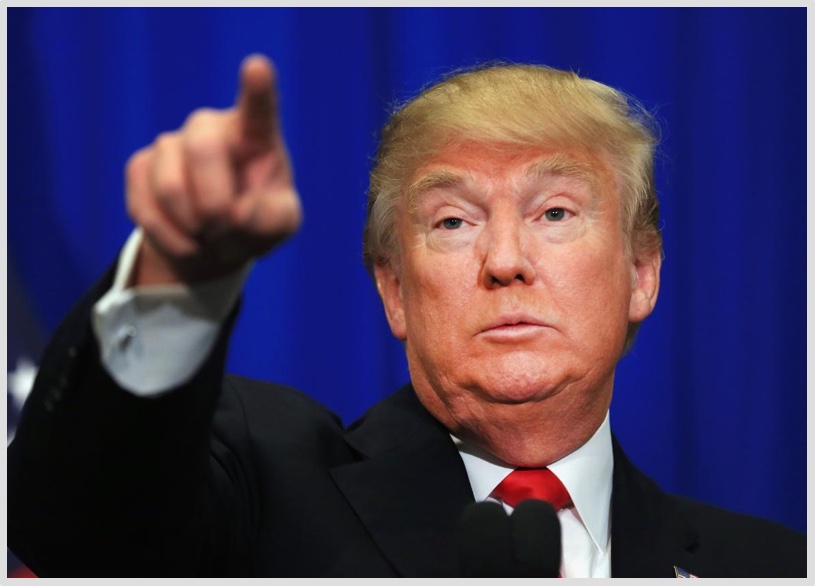
It appears these precautions may be well-founded. Our new president seems to be appointing quite a few anti-cannabis–well let’s just say for lack of a better word–“zealots” to higher office.
For instance, Trump gave the nod to Georgia’s Tom Price for Secretary of Health and Human Services. For those who don’t know who Price is, he’s a staunchly anti-cannabis Representative from Georgia who voted against almost every single pro-marijuana reform pitched by Congress.
Trump has also nominated Neil Gorsuch (a Reagan Republican favorite) for Supreme Court. Most are saying that Gorsuch is an enigma in the area of cannabis, but his court decisions speak on the issue even if his words don’t.
Gorsuch validated the fatal use of a taser by a Colorado police officer based on the logic that the victim was illegally growing marijuana, so he might be armed. He also dismissed a religious defense for use and distribution of marijuana because the defendants “don’t sincerely hold religious beliefs they claim to hold, but instead seek to use the cover of religion to pursue secular drug trafficking activities.”
Some are holding on to their optimistic outlook, counting on Gorsuch’s pro-states’ rights stance, but Swerdlow disagrees with such optimism by pointing out Republican hypocrisy when it comes to states’ rights.
Nugg: What about Trump’s Supreme Court pick?
Swerdlow: Well, that could be a problem. These Republicans are supposed to be states’ rights advocates, but when it comes to marijuana their states rights advocacy goes up in smoke.
Nugg: What do you think the logic is for back-peddling on states’ rights when it comes to marijuana?
Swerdlow: Because this is marijuana!! It’s a matter of them just using Libertarian states’ rights as an excuse to pass what they want–something they favor like voter suppression and equal rights–and then they don’t impose it when it’s something that they don’t want to pass. They’re hypocrites.
Jeff Sessions as Attorney General
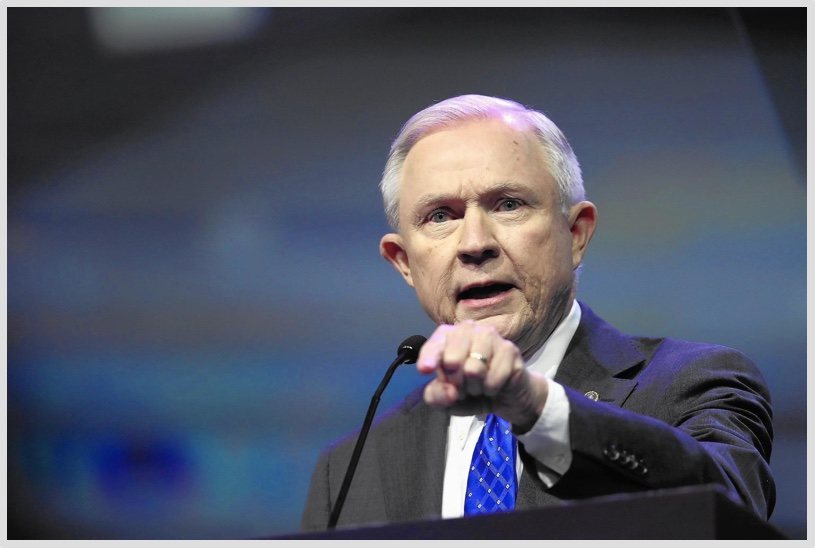
The Supreme Court pick isn’t even the cannabis community’s largest concern, believe-it-or-not. Trump’s selection for Attorney General is striking fear in the hearts of activists everywhere.
Senator Jeff Sessions, who has just been sworn in as our new AG, [Feb. 9, 2017] is known to be one of the most fanatical Regan-era, anti-cannabis despots in the nation.
He continuously tries to “correct” public perceptions on his zealotry against the plant, saying that his opinions are being misconstrued.
But his choice of words set his opinions in stark relief, with statements like, “Good people don’t smoke marijuana” and, “It is false that marijuana use doesn’t lead people to more drug use. It is already causing a disturbance in the States that have made it legal.”
Some terminally optimistic activists cite Sessions’ statement at his confirmation hearing as a sign that he might be starting to mellow out on the green:
“One obvious concern is that the U.S. Congress has made the possession of marijuana in every state, and distribution of it, an illegal act. So, if that’s something that is not desired any longer, Congress should pass a law that changes the rule. It’s not so much the Attorney General’s job to decide what laws are enforced, we should do our job and enforce laws effectively as we are able.”
But it’s quite possible that Sessions feels safe saying this because he is confident that Congress doesn’t have the stomach to take on true cannabis law reform.
In a recent interview with Fortune magazine, Mark A. R. Kleiman of NYU agrees with this sentiment, saying, “It’s simply not moving through the legislatures and I don’t know what it would take for Congress to act. The position of the Trump campaign was that this was a matter to be left to the states, but in order to leave it to the states you actually need Congressional legislation.”
The Rohrabacher-Farr Amendment Prevents Federal Interference

Swerdlow is hoping that Congress will start addressing the issue by renewing the 2014 Rohrabacher-Farr amendment on April 28th, but he isn’t holding his breath.
Nugg: Can you tell us more about what is going to happen on the 28th with the Rohrabacher–Farr amendment?
Swerdlow: This is an amendment to the Department of Justice funding bill. What it does is it denies funding to the Department of Justice to conduct any activities that impose federal [marijuana] law on states that have their own medical marijuana systems. The Obama administration has taken that to also mean recreational marijuana. It will at least keep Sessions from doing anything to medical marijuana. The question that everyone has is, “Are they [Congress] going to renew that amendment?” The way it got passed before is that 90% of the Democrats and 25% of the Republicans voted in favor of it. That was enough votes to enact it, but if Sessions and Trump put pressure on the Republican legislators not to vote for it this time, and if it doesn’t pass, that means Sessions is free to go in and do whatever he wants.
Nugg: What’s your estimation of the danger of that happening?
Swerdlow: I don’t know. I really don’t know. The real question is, “Is Trump going to stop Sessions from doing anything?” During the Trump campaign back in 2015 he said it should be left to the states. He hasn’t said very much about it since then. I’m hearing both sides. I’m hearing “Yeah, he’s going to leave it to the states,” or “No, he’s gonna let Sessions come in and start smashing heads.” I’m very concerned about Sessions’ statements. I think he’s left the door wide open for people to come in and start busting people.
Nugg: What do you think the worst case scenario is here and what do you think is the best case scenario?
Swerdlow: Well, the best case scenario is that Trump honors what he said during the campaign and he lets the states make their own decisions with no Federal interference–kind of like President Barack Obama was doing. The worst case scenario is if Trump says Sessions can go ahead and go after it. You know, there’s a lot of lawyers in the Department of Justice who are doing all this work on Wall Street and investment bankers and also on environmental issues, and Trump’s going to pull all these lawyers off these cases. He’s not going to want any kind of these investigations going on. So, Sessions is going to have all these lawyers with nothing to do, and he’s going to assign them to go into states that have cannabis laws and start filing lawsuits against all distributors and maybe even against some state agencies and states officials.
Nugg: If that happens, do you think that there’s a chance that the states could end up going backwards away from legalization?
Swerdlow: That depends on what happens in California, which is the big boy. I think Sessions is going to go after California first because if he can take out them, he’ll have no problem taking out the other states.
Organizing the Activists
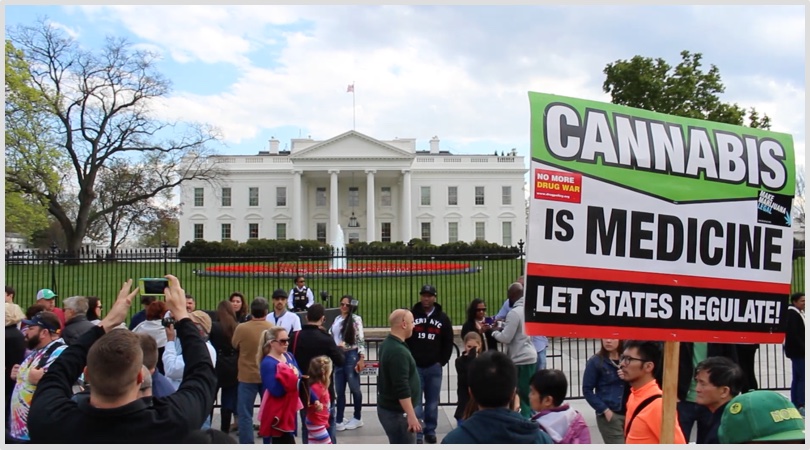
And Swerdlow isn’t just sitting on the sidelines complaining about Trump’s picks or playing armchair quarterback. He’s helping to instigate a plan of action in case the community needs to fight back.
Swerdlow: I think it’s a matter of hope for the best and prepare for the worst, but we need to start preparing right now. If we’re prepared, and they go ahead and extend the amendment, then we can say, “Ok, we don’t have to worry about it any more.” But if we don’t start preparing now and bad things start happening, you don’t want to start organizing after they have started moving against you. You want to be prepared so when they start, you are ready to take them on.
Nugg: What would be your first step to start organizing?
Swerdlow: In 1996 when 215 passed, the DPA was the one that was behind it, but as soon as it passed, they packed up up their bags and left town! The medical marijuana community didn’t know what the [bleep] to do! They should have been on the doorsteps of the State Legislature the day after it passed, banging on the doors and demanding implementation. But nothing happened for 8 years.
People were still getting busted and everything was underground. It didn’t change until 2004 when Senate Bill 420 got passed. Now the DPA has learned their lesson and they are staying around. They’ve left two people to help implement legislation and defend Prop 64.
We’ve got Lynne Lyman. She’s the California director. And then they have the special person by the name of Cat Packer. She’s the California Public Policy director for Drug Policy Alliance Los Angeles. She was at our MAPP meeting on Wednesday and we were talking about…Sessions and what they’re going to be doing.
They [the DPA] are drafting what is called noncompliance legislation. This is is kind of like sanctuary cities, where the cities tell their police [not to] cooperate with the Feds when they come in here to arrest immigrants.
This [cannabis] non-compliance legislation can be passed by the state legislature and it will direct the state government, state agencies, counties, and cities to not cooperate with the Feds if they come in here to bust state regulated marijuana distributors.
If it passes, that will cause the Feds a lot of problems because when the DEA comes in here and makes a raid they have two or three agents and a dozen or more local cops to help them do it. If they can’t get local cops to help them, they’re going be less able to do anything.
Nugg: How can the average person help with this effort?
Swerdlow: The cops will be putting enormous pressure on the legislature not to pass that law. We have to start organizing now so when that piece of legislation gets introduced, we are putting pressure on our State Assembly members and our State Senators telling them to pass it. If we do what we usually do and don’t get involved, then when it doesn’t pass and the Rorabacher-Farr amendment doesn’t pass, we’re going to get screwed. The medical marijuana community has never been politically active. I am trying to drag them kicking and screaming into political activism.
Swerdlow hopes to enroll the Democratic party in this effort as well through the Democratic Brownie Mary Club.
Swerdlow: I am drafting a resolution to introduce at the Democratic State Convention in May that will put the Democratic party in support of this legislation. I think the DPA has a couple of state legislators poised to introduce the bill. Getting it introduced isn’t the problem. The problem is getting it through the committees and getting it passed.
If you are interested in helping with these efforts, here are several contacts to get you started:
Marijuana Anti Prohibition Project: You can join MAPP and attend their Sacramento rallies to support medical marijuana rights for California patients.
Brownie Mary Democratic Club: Mr. Swerdlow is interested in starting more chapters of the Brownie Mary Democratic Club, so if there isn’t one in your area that you can join, you can start one yourself!
DPA: The DPA can use some help to spread the word about DPA’s efforts to push beneficial legislation in Sacramento.
California State Assembly: Please call your local representative and let them know that you want sensible cannabis regulations for the state. Encourage them not to cooperate with Federal raids against abiding cannabis providers in California.
California State Senate: Please call your local representative and let them know that you want sensible cannabis regulations for the state. Encourage them not to cooperate with Federal raids against abiding cannabis providers in California.
U.S. House of Representatives: Please call your local representative and encourage them to renew the Rohrabacher–Farr amendment. This may be the single most important thing you can do to help the effort.
U.S. Senate: Please call your local representative and encourage them to renew the Rohrabacher–Farr amendment. This may be the single most important thing you can do to help the effort.
While there are some challenges for sensible cannabis regulation in the near future, no one has a crystal ball that will predict exactly where President Trump’s administration will land on the issue in the end.
Our efforts as private citizens may have more effect on the shape of upcoming legislation than at any other time in history. This is why it is so important to use the links above, even if the only action we have time to take is to voice our opinions with our legislators.
The Federal government is clearly reassessing their stance on cannabis law in light of the fact that it is now legal in more than half the states in the nation, and we will shape their new position.
